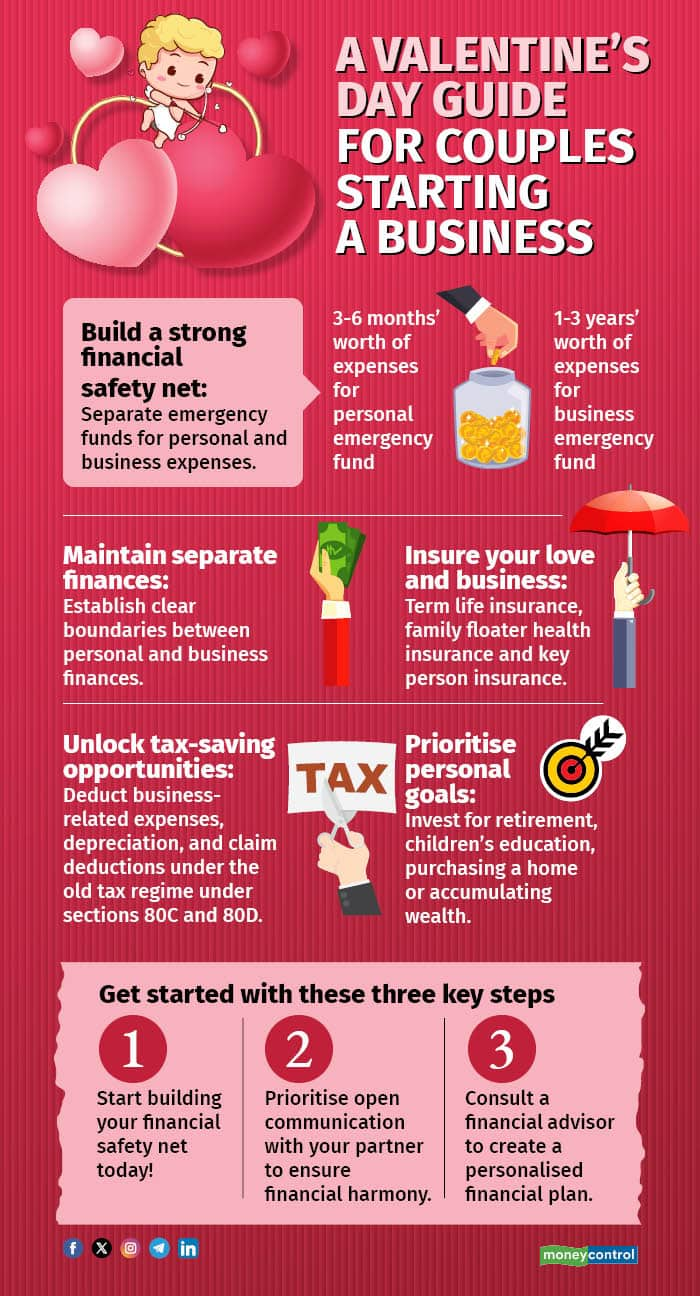



This Valentine's Day, as couples celebrate love and commitment, those embarking on a joint business venture face a thrilling yet financially daunting journey. While shared goals can fortify relationships, unmanaged financial stress can create tension, highlighting the importance of careful financial planning for both business prosperity and personal harmony.
It is important to transform potential financial pitfalls into opportunities for growth, strengthening both your relationship and entrepreneurial endeavours.
Here are some of the crucial financial planning factors for couples to consider when starting a business together.
How couples can build a strong financial safety netRunning a business comes with uncertainties, so having a financial safety net is a must. But here’s the thing—one emergency fund isn’t enough. It’s best to keep separate emergency funds for personal and business expenses.
According to Amit Suri, founder of financial services firm AUM Wealth, "Couples starting a business together should prioritise building an emergency fund to cover personal expenses, aiming to save three to six months' worth of expenses. This safeguard ensures they're prepared for unexpected personal emergencies, even if business revenue is unpredictable."
From a business perspective, Suri advises, "The ideal buffer size depends on the industry, but as a general rule, if your business is prone to delayed payments or vulnerable to economic fluctuations, it's prudent to maintain a reserve covering one to three years' worth of expenses."
To optimise returns while maintaining easy access to funds, consider investing this money in liquid assets such as debt funds, which offer a balance of liquidity and moderate returns.
Priyank Shah, co-founder and CEO of The Financialist, a financial advisory firm, emphasises the importance of disciplined investing: "By automating transfers to debt funds earmarked for emergency funds, individuals can ensure consistent savings, while regular portfolio reviews help adapt to evolving financial needs and priorities."

According to financial advisors, maintaining separate personal finances is essential for couples starting a business together.
Shah explains, "This approach safeguards financial independence, minimises disputes over expenditures and shields personal assets from potential business risks." By establishing clear boundaries between personal and business finances, couples can streamline bookkeeping, tax filing and liability management.
Moreover, Shah notes, "Separate finances promote trust, transparency and flexibility, allowing each partner to pursue individual objectives without compromising their joint business venture."
To maintain financial stability, consider drawing a regular, fixed salary from the business, decoupling personal finances from unpredictable business profits. Suri advises, "Carefully determine a consistent salary for both partners (spouses), ensuring it's a sustainable amount that won't bleed into your personal life or create unnecessary financial stress."
Also read | Here are investment tips for NRIs returning to IndiaDon't forget to insure your love and businessWhen starting a business together, couples should prioritise insurance to protect both personal and business interests.
According to financial advisors, two essential personal insurance covers for couples starting a business together are term life insurance and health insurance.
Shah emphasises that term life insurance provides financial security for one's family in the event of unforeseen circumstances, ensuring their well-being during critical years.
Suri adds that health insurance is equally vital, as it covers medical expenses without depleting savings. Shah recommends a family floater health insurance plan also, which offers comprehensive coverage for all family members under a single policy, making it a cost-effective and efficient option.
From a business perspective, insurance plays a critical role in mitigating risks such as property damage, liability, digital scams and data loss, notes Ankit Garg, CEO of Wealthy Nivesh, a financial advisory firm.
Furthermore, Suri highlights the importance of key person insurance, which provides financial protection in the event of the loss of a crucial team member, such as a spouse who plays a vital role in the business.
Also read | V-Day Special: Why honest money conversations are essential before marriageUnlock tax-saving opportunitiesCouples starting a business in India can take advantage of various tax benefits to ease their financial burden. Shah highlights that a key advantage lies in deducting business-related expenses, such as loan interest, rent, employee salaries, legal fees and utilities, under Section 37 of the Income-tax Act.
Shah also notes that depreciation on assets like machinery and equipment can be claimed under Section 32, resulting in a reduction in taxable income.
Under the old tax regime, individuals can claim deductions for contributions to provident fund and public provident fund under Section 80C, as well as health insurance premiums for their family under Section 80D.
By leveraging these tax benefits, couples can significantly reduce their tax liability, freeing up resources to build a business foundation and secure their financial future.
Also read | New Zealand revises 'golden visa' rules. Do wealthy Indians stand to gain?Don’t ignore your personal goalsAs a business owner, you have greater control over your financial destiny. However, this doesn't mean you should put retirement planning and other financial goals on hold. “In fact, it's essential to prioritise personal goals, such as investing for your retirement, children's education, purchasing a home or accumulating wealth,” says Suri.
To achieve these goals, consider setting aside a portion of your salary regularly. Allocate funds based on your priorities, risk tolerance and investment timeline, and regularly review your progress to adjust as needed.
Discover the latest Business News, Sensex, and Nifty updates. Obtain Personal Finance insights, tax queries, and expert opinions on Moneycontrol or download the Moneycontrol App to stay updated!
Find the best of Al News in one place, specially curated for you every weekend.
Stay on top of the latest tech trends and biggest startup news.